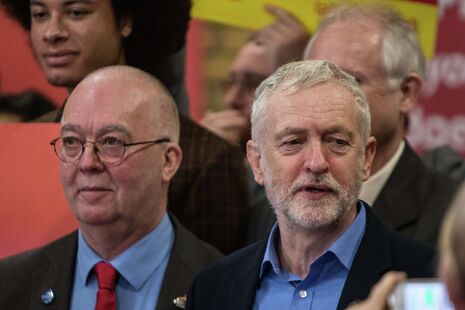Labour must embrace a second Brexit referendum
The party risk another limp election campaign, not to mention a landslide Tory victory, if they don’t campaign to stop Brexit

The Labour leader’s continued refusal to engage with Brexit, merely giving it a passing mention in his first campaign speech, is a regrettable reminder of Corbyn’s unwillingness to deal with contemporary circumstances.
This is all the more disappointing when, among fear and expectation of Labour’s further decimation in June, a strong position on Britain’s exit from the EU holds so much potential. Two such positions are plausible or, at the very least, more plausible than the expectation that sidestepping the issue will prove successful – taking ownership of the process or advocating a second referendum.
Becoming the party of a second referendum would be uncomfortable
If Corbyn was only ever 7/10 on the EU, anyway, then surely he has his reasons. Arguments from the Left can be made regarding its role in facilitating corporate interests, its strict imposition of legislation on its newer members, or its treatment of refugees at Europe’s outer borders. The case for Lexit can be made, but nobody, certainly not Labour, seems to be making it.
Another option would be to provide a channel for those that would welcome a second referendum, a chance for voters to have their say on the matter when the details of leaving are more clear. Again, however, the Labour leadership was quick to dismiss this and, in doing so, may have given up on its best chance of a successful campaign.
Becoming the party of a second referendum would be uncomfortable. Allegations of disrespecting the ‘people’s choice’ would be easy and frequent and the Leavers in the Labour ‘heartland’ would not be best pleased. It would also not provide a guaranteed route to success given that it would require Conservative Remainers to back a potential Corbyn premiership, something I accept is nigh on impossible.
However, not only can claims of an ‘undemocratic’ second referendum on the final deal, when the consequences of leaving the EU are more transparent, certainly be challenged, but much of the Labour ‘heartland’ also currently seems as unachievable for Corbyn as those Tory Remainers. Proposing a second referendum may be an unlikely route to victory, but Labour are hardly facing an abundance of promising campaign approaches with the election six weeks away, and taking this one off the table could prove costly.
Brexit will define British politics over the next five years more than anything else. This election has been called over how the country handles this issue specifically (Mrs May’s spin, not mine) and, given these circumstances, all positions on Britain’s exit from the EU must be fair game.
The election is likely to provide his biggest but also final chance to prove himself
Putting the question of leaving the EU back into play could not only tempt 16,000,000 people to the polls, a backing that would have won every election in British history, but also offer the most promising basis of any ‘progressive alliance’ among parties that otherwise don’t share as much as is frequently assumed.
If the election did end up being something of a referendum on a second referendum (OK, I can see why Brenda’s fed up), Leave voters would turn out in large numbers, too. The result would come down to whether there are more pro-EU Conservative voters voting Liberal Democrat or Labour to stop Brexit than there are Eurosceptic Labour voters that would swing to the Tories.
As it stands, the alternative seems to be a limp Labour campaign filled with stale references to the Nasty Party and working people. While anti-austerity policy may be enough to win my vote, there is no reason to believe that it would win any more than it did for Miliband in 2015.
Corbyn has built his reputation on offering a true channel to those that feel disenfranchised by decades of politics. He is bold in the face of norms, the hundreds of times he voted against the party whip worn as a badge of honour by his supporters. The election is likely to provide his biggest but also final chance to prove himself worthy of both that reputation and the responsibility that comes with leading the opposition. Making the biggest issue of contemporary British politics work in his favour, either by shaping its direction or by offering a second referendum, can only help that cause.
The Prime Minister’s declaration that the election serves the primary purpose of achieving the conditions to “make a success of Brexit” is cynical and contrived, but it is also an open invitation to deny her what she explicitly claims to seek. Given the lack of promising alternatives, Labour may do well to take the bait – it could be the only way of mounting serious opposition.
 News / Cambridge academics stand out in King’s 2026 Honours List2 January 2026
News / Cambridge academics stand out in King’s 2026 Honours List2 January 2026 Interviews / You don’t need to peak at Cambridge, says Robin Harding31 December 2025
Interviews / You don’t need to peak at Cambridge, says Robin Harding31 December 2025 Comment / What happened to men at Cambridge?31 December 2025
Comment / What happened to men at Cambridge?31 December 2025 News / Varsity’s biggest stories of 202531 December 2025
News / Varsity’s biggest stories of 202531 December 2025 Features / “It’s a momentary expression of rage”: reforming democracy from Cambridge4 January 2026
Features / “It’s a momentary expression of rage”: reforming democracy from Cambridge4 January 2026









